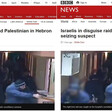Media Watch 22 November 2013
In April this year, the BBC’s Director-General Tony Hall gave assurances to members of Parliament about the BBC’s impartiality when covering Palestine.
He also told MPs that the BBC’s complaints process, headed by the BBC Trust, provides adequate checks and balances.
However, some of the BBC’s complaint unit decisions, in the months that followed Hall’s appearance before the culture, media and sports committee in the British Parliament, appear to throw serious doubt on his claims.
In July, the BBC’s editorial complaints unit, which is one level down from the Trust, ruled that a BBC Radio 4 broadcast had been inaccurate when it said “the blockade of Gaza, for example, has led to shortages of medicines and medical equipment.”
The complaint had been brought by a listener to the Health Check program on the BBC World Service, broadcast in October 2012.
As the editorial complaints unit ruling states: “A listener complained that an item on the situation of people with kidney failure in Gaza gave the misleading impression that medical supplies and equipment were subject to the Israeli blockade.”
Essential drugs dwindle
These are the words, uttered by presenter Angela Robson, which drew the complaint: “the blockade of Gaza, for example, has led to shortages of medicines and medical equipment.”
After considering the complaint, the editorial complaints unit ruled that the sentence “gave the impression that the Israeli blockade covered medical supplies, which is not the case.” And this part of the complaint was upheld.
Yet if you look at the sentence, its meaning is quite clear — that the blockade of Gaza has led to shortages of medicines and medical equipment.
Nothing else is implied in the sentence, and there is nothing in the words which either suggests or says outright that medical supplies are covered by the blockade.
Here is the reality which the BBC’s complaints team chose to ignore as it looked for ways to uphold the complaint. In March 2013, a few months before the BBC issued its ruling, the World Health Organization said the number of essential drug items at zero stock level in Gaza was 31.25 percent.
The number of essential disposable medical items at zero stock level was 53.3 percent. The reason for essential drugs and medical supplies running out in Gaza is the financial crisis caused by Israel’s occupation and siege.
Existing medical equipment that has broken down cannot be fixed because spare parts cannot be brought into Gaza due to the blockade.
In other words, as Angela Robson said in her report, “the blockade of Gaza, for example, has led to shortages of medicines and medical equipment.”
Israel “vilified?”
Two months after this ruling was put onto the BBC website, the BBC Trust issued another ruling — this time that a BBC Two program, A History of Syria with Dan Snow, had been inaccurate when it “implied” that Israel started the 1967 War.
Snow, during the hour-long broadcast in March, said: “In 1967, [Hafez] Assad was minister of defense when Israel launched a series of strikes against Egypt, Jordan and Syria …”
According to the BBC Trust’s ruling in September, which has been published online: “The complainant wrote to the BBC saying it was unsurprising that Israel was vilified when a BBC presenter could imply that the Jewish state started the 1967 war.”
And yet, it is generally accepted that the first strikes in the war, which resulted in the ongoing Israeli military occupation of East Jerusalem and the wider West Bank, Gaza and the Golan Heights, were made by Israel.
Even the website of the Israeli parliament, the Knesset, says this: “In the early morning of 5 June 1967, the war broke out. Israel made a preemptive strike on the Egyptian Air Force: The Air Force attacked all military airports in Egypt and the Sinai Peninsula, destroying hundreds of aircrafts and neutralizing the Egyptian Air Force.”
And the BBC Trust, in its ruling, “noted that the first air strikes were on Egypt.”
However, having acknowledged this, the Trust then found a way to uphold the complaint.
It eventually decided “that the events of the Six Day War were so important in the history and politics of the Middle East, and remain so today, that, despite the brevity of the reference, more context was required and the need to use clear and precise language was particularly acute in relation to content dealing with conflict in the Middle East.” And the complaint was upheld.
Inaccuracies over Jerusalem
Both these complaints, claiming inaccuracy, were upheld by the BBC despite how they related to factually accurate statements.
Compare the BBC’s decisions on these two cases with the Palestine Solidarity Campaign’s attempts to elicit accurate reporting from the BBC on the status of Jerusalem.
The BBC, across its radio, television and online output, frequently refers to Jerusalem as an Israeli city, refusing to make the distinction, outlined in international law, between East Jerusalem and West Jerusalem.
Neither the occupation of East Jerusalem in 1967 by Israel, nor its subsequent annexation, are recognised by international law (Article 2 [4], UN Charter) or conventions (Fourth Geneva Convention).
Additionally, no country recognizes Israel’s sovereignty over West Jerusalem, which is considered only to be under de facto Israeli control.
So how can the BBC legitimately refer to Jerusalem, in its entirety, as an Israeli city? How is this definition of Jerusalem in any way accurate?
Flying in the face of international law
And yet the BBC Trust has insisted to the Palestine Solidarity Campaign (PSC) that it is not breaching its editorial guidelines on accuracy by referring to Jerusalem as an Israeli city.
In May 2013, the Trust said it would not consider a complaint from the PSC that the BBC’s reference to Jerusalem as an Israeli city during a Radio 4 Today program broadcast was inaccurate, following advice from its senior editorial advisor, Leanne Buckle.
The Trust said: “The advisor acknowledged that Israel’s sovereignty over the whole of Jerusalem was not recognized under international law. However, she considered that Israel had de facto control over the entire city in a political, administrative and military sense. She also noted that Jerusalem was administered as a single entity by the Jerusalem municipal authority which made no distinction between East and West.”
On this basis, the Trust ruled, there was no inaccuracy in saying Jerusalem is Israeli.
Buckle’s advice, of course, flies in the face of international law and international opinion.
But this does not seem to bother the BBC. In July, the PSC wrote to the BBC listings magazine Radio Times, about a crossword clue it carried where the required answer to a clue reading “major Israeli city” was “Jerusalem.”
This response was received: “While Radio Times is no longer owned by the BBC, Ben Preston [editorial director, Radio Times] has noted the recent statement by the BBC’s Senior Editorial Strategy Advisor, Leanne Buckle, that the corporation allows Jerusalem to be referred to as an ‘Israeli’ city, notwithstanding questions of international recognition and East Jerusalem.”
Arrogance
And there it is — the BBC has made a political decision and designated Jerusalem as Israeli, notwithstanding issues of international law and international recognition.
The arrogance is breath-taking. But so is the hypocrisy.
On the one hand, the BBC Trust has ruled that the 1967 War was of such political and historical importance that BBC presenters cannot even imply that it was started by Israel — even though Israel fired the first shots.
Nor must it be implied on the BBC that Israel’s siege of Gaza is responsible for shortages in medicines and medical equipment — and yet the blockade has led, directly and indirectly, to such shortages.
On the other hand, the BBC Trust seems to believe that the status of Jerusalem is of such little political and historical significance, that BBC reporters can be as inaccurate as they want when referring to it.
When Tony Hall told MPs in April that the BBC is impartial in its coverage of Palestine, and that the BBC Trust can be relied upon to provide checks and balances on that coverage, he couldn’t have been more wrong.






Comments
preventing censorship by contagion
Permalink s maloney replied on
Dear Ms Saleem
"On the one hand, the BBC Trust has ruled that the 1967 War was of such political and historical importance that BBC presenters cannot even imply that it was started by Israel — even though Israel fired the first shots."
Why so coy?
Why not:
On the one hand, the BBC Trust has ruled that the 1967 War was of such political and historical importance that BBC presenters cannot even imply that it was started by Israel — even though Israel began its preemptive war - usually condemned as the "supreme international crime" - by launching an unprovoked suprise attack on Egypt, destroying most of that country's air force on the ground?